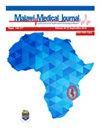The validity and reliability of the Turkish version of the Brief Fear of Negative Evaluation Scale – straight forwardly in patients with systemic sclerosis
IF 0.8
4区 医学
Q4 PUBLIC, ENVIRONMENTAL & OCCUPATIONAL HEALTH
引用次数: 0
Abstract
Objective This study aimed to examine the validity and reliability of Turkish version of Brief Fear of Negative Evaluation Scale–Straightforwardly (BFNE-S (TR)) in patients with Systemic Sclerosis (SSc).Materials and Methods 35 individuals (mean age: 53.3±13.0 years) diagnosed as SSc were included. Data on demographics, were collected via structured interview. All participants were evaluated by same investigator. The disability was evaluated with Scleroderma Health Assessment Questionnaire (SHAQ), disease severity with Medsger’s Disease Severity Scale, and skin involvement with Modified Rodnan Skin Score. BFNE-S (TR) was applied to the patients with SSc who did not receive any treatment for test retest at one-week intervals. Results The one-factor structure was provided for all indices except Chi-Square. Factor loadings were significant. The patient responses to the BFNE-S (TR) demonstrated excellent internal consistency (Cronbach’s α: 0.95). The floor effect (20%) percentage of patients who scored at floor level, was observed. Test-retest reliability of the scale was excellent with 0.91 (95%CI: 0.78–0.96). BFNE-S (TR) total score had positive correlation with SHAQ_Digestive (r=0.503) and SHAQ_Raynaud phenomenon (r=0.343)(p<0.05).Conclusions The BFNE-S (TR) is a reliable and valid scale and can be used for measurement of fear of negative evaluation in SSc.土耳其版负面评价量表的效度和信度-直接在系统性硬化症患者
目的探讨土耳其版《直接负面评价简易恐惧量表》(BFNE-S (TR))在系统性硬化症(SSc)患者中的效度和信度。材料与方法入选35例SSc患者,平均年龄53.3±13.0岁。人口统计数据通过结构化访谈收集。所有参与者均由同一研究者进行评估。用硬皮病健康评估问卷(SHAQ)评估残疾,用Medsger疾病严重程度量表评估疾病严重程度,用改良罗德曼皮肤评分评估皮肤受累程度。对未接受任何治疗的SSc患者应用BFNE-S (TR),每隔一周进行复测。结果除卡方分析外,其余指标均符合单因素结构。因子负荷显著。患者对BFNE-S (TR)的反应表现出良好的内部一致性(Cronbach 's α: 0.95)。观察得分达到最低水平的患者的最低效应(20%)百分比。量表的重测信度为0.91 (95%CI: 0.78 ~ 0.96)。BFNE-S (TR)总分与shaq_消化道(r=0.503)、shaq_雷诺现象(r=0.343)呈正相关(p < 0.05)。结论BFNE-S (TR)量表是一种可靠、有效的量表,可用于评估SSc患者对负面评价的恐惧程度。
本文章由计算机程序翻译,如有差异,请以英文原文为准。
求助全文
约1分钟内获得全文
求助全文
来源期刊

Malawi Medical Journal
Medicine-General Medicine
CiteScore
1.50
自引率
0.00%
发文量
27
审稿时长
>12 weeks
期刊介绍:
Driven and guided by the priorities articulated in the Malawi National Health Research Agenda, the Malawi Medical Journal publishes original research, short reports, case reports, viewpoints, insightful editorials and commentaries that are of high quality, informative and applicable to the Malawian and sub-Saharan Africa regions. Our particular interest is to publish evidence-based research that impacts and informs national health policies and medical practice in Malawi and the broader region.
Topics covered in the journal include, but are not limited to:
- Communicable diseases (HIV and AIDS, Malaria, TB, etc.)
- Non-communicable diseases (Cardiovascular diseases, cancer, diabetes, etc.)
- Sexual and Reproductive Health (Adolescent health, education, pregnancy and abortion, STDs and HIV and AIDS, etc.)
- Mental health
- Environmental health
- Nutrition
- Health systems and health policy (Leadership, ethics, and governance)
- Community systems strengthening research
- Injury, trauma, and surgical disorders
 求助内容:
求助内容: 应助结果提醒方式:
应助结果提醒方式:


